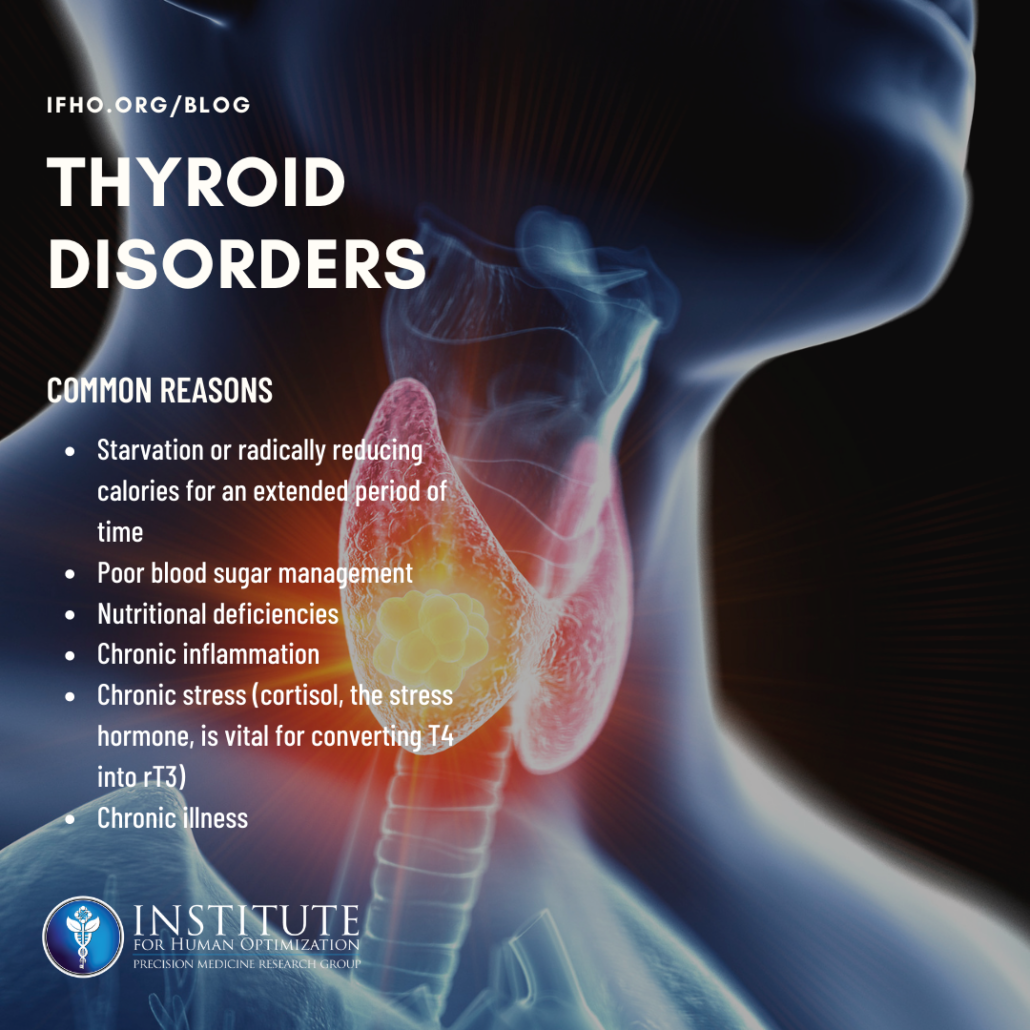There’s a tiny gland in your neck, right below the Adam’s apple, that is responsible for almost all of your bodily functions. It’s called your thyroid and because you literally can’t live without it, it’s vital to keep it functioning properly. In Part I of our endocrine series we discussed the basic structures and functions of the endocrine system. In Part II we dove into how the HPA axis works with cortisol to manage stress. In this part, we’ll talk about the all-important thyroid and how the Institute for Human Optimization assess patient thyroids with the latest testing to guarantee accurate results.
Your thyroid works a bit like your air conditioner. The pituitary gland is the thermostat, it senses when your body is low on hormones and sends a signal to the thyroid using TSH (thyroid-stimulating hormone).
When the thyroid picks up the TSH, it pumps out the exact amount of hormone needed to make sure everything runs smoothly. Your thyroid is responsible for a variety of functions including menstrual cycles, metabolism, heart function, brain functions, digestion, and mood.
Its main responsibility is converting iodine from food into thyroid hormones, known as thyroxine (T3) and triiodothyronine (T3). Thyroid cells are the only cells in the body that can absorb iodine. T4 is responsible for your metabolism, mood, and body temperature, among other things. T3 is made in the thyroid gland but can also be made in other tissues within the body by converting T4 into T3.
If you have a properly working thyroid, it’ll dispense about 80% of the T4 hormone and 20% of the T3. About half of the T4 will be converted into T3 throughout the day. Whatever isn’t used gets flushed out in a process called reverse T3.
Basically, reverse T3 (rT3) is an inactive ‘thyroid hormone’, but one that can sometimes cause health issues when everything else is seemingly functioning as it should be. Because T3 and rT3 compete for spots on cellular receptor sites. If there’s too much rT3, regular T3 can’t bind to the receptors, weakening its effects. This can result in symptoms of hypothyroidism, even if T3 levels are within range.
In early humans, stress from starvation or danger would trigger the reduction of rT3, slowing the metabolism and conserving energy. This is why today when we go on sudden crash diets or suddenly take up intense cardio workouts, our bodies respond the same way they always have- shutting down functions like sexual reproduction and digestion. If you’re running from danger or starving, your body sees no reason to have kids and can inhibit sex hormones such as testosterone.
Some common reasons for thyroid disorders include:
- Starvation or radically reducing calories for an extended period of time
- Poor blood sugar management
- Nutritional deficiencies
- Chronic inflammation
- Chronic stress (cortisol, the stress hormone, is vital for converting T4 into rT3)
- Chronic illness

Thyroid Disorders
It’s estimated that about 12% of the United States population will experience some kind of thyroid disorder in their lifetime. It’s helpful to know the differences between the most common thyroid disorders and their symptoms so you can get treatment as soon as possible.
- Hypothyroidism
This is caused by an underactive thyroid and can cause fatigue, weight gain, weakness, depression, sensitivity to cold, slow heart rate, and in extreme cases, coma. Diagnosis for hypothyroidism generally follows a test resulting in high TSH l and low T4 levels. Treatment generally includes supplementation of thyroid hormone and doctors must be careful to get the dosage right and not cause the opposite reaction. - Hyperthyroidism
Hyperthyroidism is the opposite- the thyroid is overactive and producing too much hormone. This is more common in women than men and can cause anxiety, racing heart, thin skin, irritability, brittle hair and nails, and weight loss. People who suffer from hyperthyroidism generally test low for TSH and high for T4. Doctors will prescribe drugs that inhibit the thyroid or in extreme cases, surgically remove a portion of it. - Hashimoto’s Thyroiditis
In this form of hypothyroidism, the immune system attacks the thyroid and begins to destroy it. Symptoms include heavy or irregular menstruation, pale puffy face, fatigue, intolerance to cold, thinning hair, or enlargement of the thyroid. There is no cure for Hashimoto’s and it can only be distinguished from hypothyroidism by testing the blood for TPO antibodies. A recent study suggested that cutting out gluten could provide clinical benefits to women with Hashimoto’s disease. - Grave’s Disease
This is another autoimmune disease in which the immune system mistakenly attacks the thyroid. However, Grave’s disease causes the thyroid to overproduce the hormone responsible for regulating metabolism, resulting in increased heart rate, anxiety, bulging eyes, and possibly hand tremors. People with Grave’s disease will have low levels of TSH and high levels of T4, similar to hyperthyroidism. Similar to Hashimoto’s, there is no current strategy to stop the immune system from attacking the thyroid so managing symptoms using beta-blockers, iodine, and possibly surgery are the common forms of treatment. - Goiter
Goiter is a noncancerous enlargement of the thyroid gland. Generally, this is caused by a lack of iodine in the diet. In the US people consume plenty of iodine in the form of table salt, so a goiter is usually a symptom of hyperthyroidism. Due to the thyroid’s placement in the throat, enlargement can cause difficulty breathing or swallowing, hoarseness, and tightness in the neck. Goiters can be left alone if they’re not severe but often require surgery to remove.
Testing the Thyroid
Doctors today have an abundance of testing technology to properly diagnose thyroid disorders. While they used to rely solely on testing TSH, they’re now able to test all thyroid hormone levels and get a more accurate depiction of function.
At the Institute for Human Optimization, we provide a complete hormone panel for our patients. We test for TSH, T3, T4, and reverse T3 levels to take a deep dive into how your thyroid is functioning. So many organs and structures rely on the thyroid to work properly, so it’s of the utmost importance that we treat any signs of hyper or hypothyroidism immediately.
A recent study found that taking biotin supplements can actually throw off testing, making it seem like Grave’s or Hashimoto’s when the thyroid is actually functioning properly. It’s important to let your doctor know if you’re taking biotin before testing and possibly stop the supplements temporarily to get accurate results.
If you suspect you might have thyroid issues, contact your physician for testing or schedule a discovery call with the Institute for Human Optimization here.

